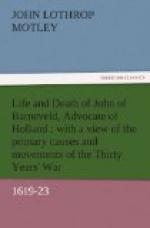“Here is the cage, but your bird is flown,” said corpulent Maria Grotius with a placid smile. The Commandant solaced himself by uttering imprecations on her, on her husband, and on Elsje van Houwening. But these curses could not bring back the fugitive. He flew to Gorcum to browbeat the Daatselaers and to search the famous trunk. He found in it the big New Testament and some skeins of thread, together with an octavo or two of theology and of Greek tragedies; but the Arminian was not in it, and was gone from the custody of the valiant Deventer for ever.
After a brief period Madame de Groot was released and rejoined her husband. Elsje van Houwening, true heroine of the adventure, was subsequently married to the faithful servant of Grotius, who during the two years’ imprisonment had been taught Latin and the rudiments of law by his master, so that he subsequently rose to be a thriving and respectable advocate at the tribunals of Holland.
The Stadholder, when informed of the escape of the prisoner, observed, “I always thought the black pig was deceiving me,” making not very complimentary allusion to the complexion and size of the lady who had thus aided the escape of her husband.
He is also reported as saying that it “is no wonder they could not keep Grotius in prison, as he has more wit than all his judges put together.”
CHAPTER XXIII.
Barneveld’s Sons
plot against Maurice—The Conspiracy betrayed
to
Maurice—Escape
of Stoutenburg—Groeneveld is arrested—Mary
of
Barneveld appeals to
the Stadholder—Groeneveld condemned to Death—
Execution of Groeneveld.
The widow of Barneveld had remained, since the last scene of the fatal tragedy on the Binnenhof, in hopeless desolation. The wife of the man who during a whole generation of mankind had stood foremost among the foremost of the world, and had been one of those chief actors and directors in human affairs to whom men’s eyes turned instinctively from near and from afar, had led a life of unbroken prosperity. An heiress in her own right, Maria van Utrecht had laid the foundation of her husband’s wealth by her union with the rising young lawyer and statesman. Her two sons and two daughters had grown up around her, all four being married into the leading families of the land, and with apparently long lives of prosperity and usefulness before them. And now the headsman’s sword had shivered all this grandeur and happiness at a blow. The name of the dead statesman had become a word of scoffing and reproach; vagabond mountebanks enacted ribald scenes to his dishonour in the public squares and streets; ballad-mongers yelled blasphemous libels upon him in the very ears of his widow and children. For party hatred was not yet glutted with the blood it had drunk.
It would be idle to paint the misery of this brokenhearted woman.




